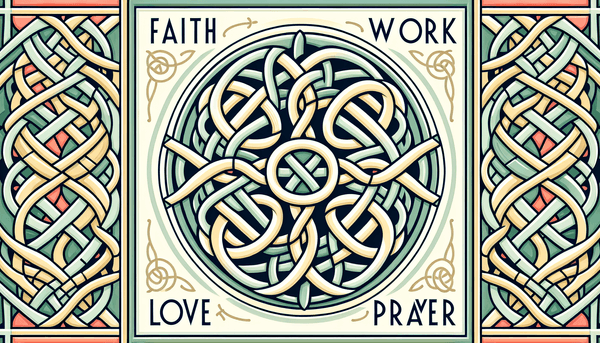The Honor and Value of Women in the Bible
In the Book of Judges, chapter 4, we encounter Deborah, a prophetess and judge in Israel, an extraordinary figure who exemplifies God's use of women in leadership roles. Deborah's wisdom and authority were recognized as she held court under the Palm of Deborah, guiding the Israelites during a time of oppression. The story of Deborah is not an isolated instance; it reveals a pattern throughout the Bible where women are depicted as leaders, prophets, and disciples. Proverbs 31:10 lauds a 'woman of noble character,' highlighting qualities such as strength, wisdom, and industriousness. Moreover, Galatians 3:28 articulates the spiritual equality of all believers, stating 'There is neither Jew nor Gentile, neither slave nor free, nor is there male and female, for you are all one in Christ Jesus,' affirming that women stand equally before God alongside men. The Bible's view of women is not monolithic but rather portrays them as complex, capable, and honored within the faith community.
Confronting Worry with Faith
Anxiety and worry are part of the human condition, often exacerbated in times of uncertainty. However, the Bible provides a wellspring of comfort and guidance on how to confront these challenges. Jesus Himself addresses the issue of worry in Matthew 6:25-34, urging His followers to trust in God's provision rather than be consumed by anxiety. Taking a cue from Jesus' teachings, John 14:1 offers a poignant invitation: 'Do not let your hearts be troubled. You believe in God; believe also in me.' This assurance is echoed in the epistle of 1 Peter 5:7, which encourages believers to 'cast all your anxiety on him because he cares for you.' The Scriptures invite us to replace worry with faith, offering a peace that transcends understanding as described in Philippians 4:6-7, and to rely on God's strength as we are reminded in Isaiah 41:10.
Deborah's Leadership and Legacy
The story of Deborah's leadership as told in Judges 4 extends beyond her capacity as a judge and a prophetess to a legacy of faith and obedience. When she commanded Barak to lead the Israelites against King Jabin's commander Sisera, the unfolding victory underscored God's ability to deliver through those who respond to His summons. This event reached its zenith as Jael, another impactful woman, actualized Deborah's prophecy by vanquishing Sisera, underscoring the unforeseen methods through which God may act via individuals. The Song of Deborah in Judges 5 not only celebrates divine intervention but also serves as a testament to His supremacy, echoing biblical wisdom and leadership principles similar to those found in Miriam's song (Exodus 15:20-21). These narratives commend the steadfastness and courage of women who were instrumental in the annals of God's people.
Seeking Employment Through Prayer
The pursuit of employment can be a trying and faith-testing journey. Yet, the Bible encourages us to lay our concerns before God and to seek His guidance in all areas of life, including our careers. Proverbs 16:3 advises us to 'Commit to the Lord whatever you do, and he will establish your plans.' This principle of entrusting our job searches to God is further supported by the counsel in James 1:6 to 'ask in faith, with no doubting.' As we prioritize our spiritual pursuits, aligning our hearts with God's will as suggested in Matthew 6:33, we can trust that our earthly needs will also be addressed. The Scriptures remind us that diligence in our work is rewarded (Proverbs 14:23) and that God has plans for our welfare and hope (Jeremiah 29:11).
Conclusion
This exploration of the Biblical perspective on the valorization of women, the management of worry, and the trust in God's guidance for our vocations has revealed a tapestry of divine wisdom and comfort. Stories like that of Deborah not only celebrate the crucial role of women in God's plan but also offer potent examples of faith in action. The Bible's teachings on worry provide a blueprint for finding peace amidst life's storms, and its guidance on employment reminds us to seek God's kingdom first. As we reflect on these themes, may we find solace in the knowledge that God's love and plans for our lives encompass all aspects, even when His answers to our prayers are not what we expect. Our trust in Him is the bedrock upon which we can build a life of faith and purpose.
FAQ
Q: What is the significance of Deborah's story in Judges 4?
A: The story of Deborah in Judges 4 exemplifies God's empowerment of women to lead and deliver His people. It emphasizes the importance of obedience to God's call and demonstrates that victory can come through unexpected individuals and means.
Q: What does Proverbs 31:10 mean?
A: Proverbs 31:10 describes the qualities of a virtuous woman, highlighting her strength, wisdom, and industrious nature. It praises the value of a woman of noble character within her family and community.
Q: How does the Bible address the topic of worry?
A: The Bible provides guidance on managing worry by encouraging believers to trust in God's provision and care. Verses such as Matthew 6:25-34, John 14:1, and 1 Peter 5:7 offer comfort and direct followers to replace anxiety with faith.
Q: What does Galatians 3:28 say about the equality of men and women?
A: Galatians 3:28 states that in Christ, there is no distinction between Jew and Gentile, slave and free, male and female. It underscores the spiritual equality of all believers, affirming that women and men are equally valued in the eyes of God.






